Vitranc | E+ | Getty Images
One provision in Republicans’ “big beautiful” bill would narrow the relief options for struggling student loan borrowers. House and Senate Republicans both call for the elimination of both the economic hardship and unemployment deferment.
Those deferments allow federal student loan borrowers to pause their monthly bills during periods of joblessness or other financial setbacks, often without interest accruing on their debt.
Less attention has been paid to the GOP plan to do away with the deferments than its proposals to eliminate several student loan repayment plans and to establish a minimum monthly payment for borrowers.
The House advanced its version of the One Big Beautiful Bill Act in May. The Senate Committee on Health, Education, Labor and Pensions released its budget bill recommendations related to student loans on June 10. Senate lawmakers are preparing to debate the massive tax and spending package.
More from Personal Finance:
Here’s the inflation breakdown for May 2025
What’s happening with unemployed Americans — in five charts
The economic cost of Trump, Harvard battle over student visas
Nixing the deferments could have major consequences, said Abby Shafroth, director of the National Consumer Law Center’s Student Loan Borrower Assistance Project.
“I’m concerned this is going to lead more people to default on their student loans when they encounter a job loss, surprise medical expense or other economic hardship,” Shafroth said.
The Trump administration said this spring that the number of student loan borrowers in default could soon rise from more than 5 million to roughly 10 million in the coming months.
July 1, 2026 would no longer qualify for the unemployment deferment or economic hardship deferment. The House plan does away with both deferments a year earlier, on July 1, 2025.
The unemployment deferment is typically available to student loan borrowers who are seeking but unable to find full-time employment or are eligible for jobless benefits, among other requirements, according to the National Consumer Law Center. Under the deferment, borrowers can pause their payments for up to six months at a time, and for a total of three years over the life of the loan.
The absence of the relief “means that for someone who lost their job and is struggling to keep their head above water, the government will demand monthly payments on student loans,” Shafroth said.
The bill comes as the share of entry-level employees who report feeling positive about their employers’ business prospects dropped to around 43% in May, a record low, according to a recent report by Glassdoor.
The economic hardship deferment, meanwhile, is generally available to student loan borrowers who receive public assistance, earn below a certain income threshold or work in the Peace Corps. The total time a borrower can spend in an economic hardship deferment is also three years.
The end of the deferments “eliminates one of the key benefits on subsidized loans,” said higher education expert Mark Kantrowitz.
Persis Yu, deputy executive director of the Student Borrower Protection Center, agreed.
“The ability of borrowers to pause payments and interest on subsidized loans during financial shocks and hardship is a critical benefit of the federal loan program,” Yu said.
The ability of borrowers to pause payments and interest on subsidized loans during financial shocks and hardship is a critical benefit of the federal loan program.
Persis Yu
deputy executive director of the Student Borrower Protection Center
Around 150,000 federal student loan holders were enrolled in the unemployment deferment in the second quarter of 2025, while around 70,000 borrowers had qualified for an economic hardship deferment, according to data by the U.S. Department of Education.
The absence of the deferments will push more federal student loan borrowers into a forbearance, experts say, during which interest continues to climb on their debt and borrowers often resume repayment with a larger bill.
Republicans say doing away with the payment pauses will encourage borrowers to enroll in repayment plan they can afford.
statement on June 10, that his party’s proposals would stop requiring that taxpayers who didn’t go to college foot the loan payments for those with degrees.
“Biden and Democrats unfairly attempted to shift student debt onto taxpayers that chose not to go to college,” Cassidy said.
Cassidy said the higher education legislation, which also stretches out student loan repayment timelines, would save taxpayers at least $300 billion.



